
Bronski Beat were a British synth-pop band formed in 1983 in London, England. The initial lineup, which recorded the majority of their hits, consisted of Jimmy Somerville (vocals), Steve Bronski and Larry Steinbachek. Simon Davolls contributed backing vocals to many songs.

"Under Pressure" is a song by the British rock band Queen and singer David Bowie. Originally released as a single in October 1981, it was later included on Queen's 1982 album Hot Space. The song reached number one on the UK Singles Chart, becoming Queen's second number-one hit in their home country and Bowie's third, and also charted in the top 10 in more than 10 countries around the world.

"Life on Mars?" is a song by the English singer-songwriter David Bowie, first released on his 1971 album Hunky Dory. Bowie wrote the song as a parody of Frank Sinatra's "My Way". "Life on Mars?" was recorded on 6 August 1971 at Trident Studios in London, and was co-produced by Bowie and Ken Scott. Bowie's backing band consisted of guitarist and string arranger Mick Ronson, bassist Trevor Bolder, drummer Mick Woodmansey and Strawbs member Rick Wakeman on piano. "Life on Mars?" is primarily a glam rock ballad, with elements of cabaret and art rock; it has a complex structure that includes chord changes throughout. The lyrics are about a girl who goes to a cinema to escape reality, and include surreal images that reflect optimism and the effects of Hollywood.

"Dancing in the Street" is a song written by Marvin Gaye, William Stevenson, and Ivy Jo Hunter. It first became popular in 1964 when recorded by Martha and the Vandellas whose version reached No. 2 on the Billboard Hot 100 chart for two weeks, behind "Do Wah Diddy Diddy" by Manfred Mann and it also peaked at No. 4 on the UK Singles Chart. It is one of Motown's signature songs and is the group's premier signature song.
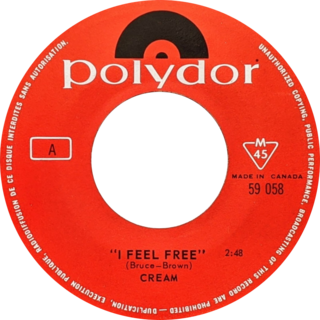
"I Feel Free" is a song first recorded by the British rock band Cream. The lyrics were written by Pete Brown, with the music by Jack Bruce. The song showcases the band's musical diversity, effectively combining blues rock with psychedelic pop.
"War" is a counterculture-era soul song written by Norman Whitfield and Barrett Strong for the Motown label in 1969. Whitfield first produced the song – a self-evident anti-Vietnam War statement – with The Temptations as the original vocalists. After Motown began receiving repeated requests to release "War" as a single, Whitfield re-recorded the song with Edwin Starr as the vocalist, with the label deciding to withhold the Temptations' version from single release so as not to alienate that group's more conservative fans. Starr's version of "War" was a No. 1 hit on the Billboard Hot 100 chart in 1970, and is not only the most successful and well-known record of his career, but it is also one of the most popular protest songs ever recorded. It was one of 161 songs on the no-play list issued by Clear Channel following the events of September 11, 2001.

"The Hearts Filthy Lesson" is a song by English musician David Bowie from his 20th studio album, Outside (1995), and issued as a single ahead of the album. Released in September 1995 by Arista, BMG and RCA, it showcased Bowie's new, industrial-influenced sound. Lyrically, the single connects with the rest of the album, with Bowie offering a lament to "tyrannical futurist" Ramona A. Stone, a theme continued in subsequent songs. The song is also meant to confront Bowie's own perceptions about the ritual creation and degradation of art. Its music video was directed by Samuel Bayer and was so controversial that it required a re-edit for MTV. The song appears in the end credits of the 1995 film Seven.
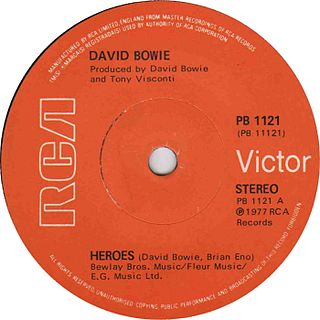
"'Heroes'" is a song by the English musician David Bowie from his 12th studio album of the same name. Co-written by Bowie and Brian Eno and co-produced by Bowie and Tony Visconti, the song was recorded in mid-1977 at Hansa Studio 2 in West Berlin. The backing track was recorded fully before lyrics were written; Bowie and Eno added synthesiser overdubs while Robert Fripp contributed guitar. To record the vocal, Visconti devised a "multi-latch" system, wherein three microphones were placed at different distances from Bowie and would open when he sang loud enough. Like other album tracks, he improvised lyrics while standing at the microphone.
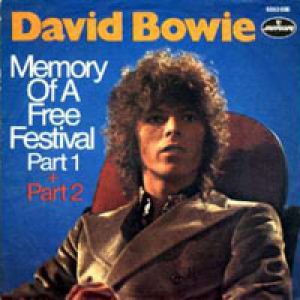
"Memory of a Free Festival" is a song by the English singer-songwriter David Bowie. Originally recorded in September 1969 as a seven-minute opus for Bowie's second self-titled album, it was reworked in March–April 1970 at the behest of Mercury Records, the label believing that the track had a better chance of success as a single than "The Prettiest Star", released earlier in the year. Bowie and Tony Visconti roughly split the track in half, re-recording it so both halves could function as individual songs. A more rock-oriented version than the earlier album cut, this rendition featured guitarist Mick Ronson.
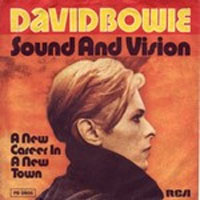
"Sound and Vision" is a song by the English musician David Bowie. It was released in January 1977 by RCA Records on side one of his 11th studio album Low. RCA later chose it as the first single from the album. Co-produced by Bowie and Tony Visconti, the song was recorded at the Château d'Hérouville in Hérouville, France, in September 1976, and completed at Hansa Studios in West Berlin in October and November. The song began as a simple G major chord progression that Bowie gave to the backing musicians, writing and recording his vocals afterward. It features backing vocals from Brian Eno and Visconti's then-wife Mary Hopkin.

"Let's Dance" is a song by the English singer-songwriter David Bowie, originally included as the title track of his 1983 album of the same name. Co-produced by Nile Rodgers of Chic, it was recorded in late 1982 at the Power Station in New York City. With the assistance of engineer Bob Clearmountain, Rodgers transformed the song from its folk rock origins to a dance number through studio effects and new musicians Bowie had yet to work with. Bowie hired then-unknown Texas guitarist Stevie Ray Vaughan, who added a blues-edge.
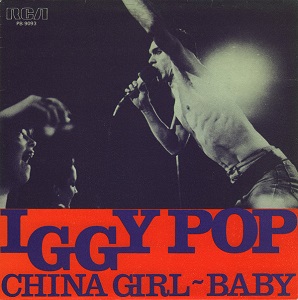
"China Girl" is a song written by Iggy Pop and David Bowie in 1976, and first released by Pop on his debut solo album, The Idiot (1977). Inspired by an affair Pop had with a Vietnamese woman, the lyrics tell a story of unrequited love for the protagonist's Asian girlfriend, realizing by the end that his Western influences are corrupting her. Like the rest of The Idiot, Bowie wrote the music and Pop improvised the lyrics while standing at the microphone. The song was released as a single in May 1977 and failed to chart.
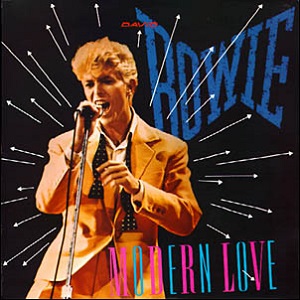
"Modern Love" is a song written by the English singer-songwriter David Bowie. It was released as the opening track on his 1983 album Let's Dance and issued as the third single from the album later in the year. Co-produced by Bowie and Nile Rodgers of the American band Chic, it is a rock song that contains elements of new wave music. It was recorded at the Power Station in Manhattan and was one of the first tracks recorded for the album. It was performed by Bowie on the Serious Moonlight Tour, where it often closed the shows. A music video for the song, directed by Jim Yukich and featuring a performance of the song during the tour, was released in 1983 and played frequently on MTV.
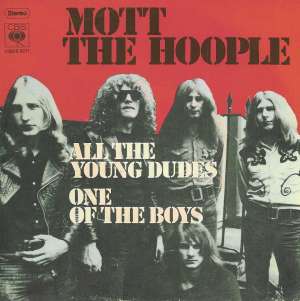
"All the Young Dudes" is a song written by English singer-songwriter David Bowie, originally recorded and released as a single by the English rock band Mott the Hoople in 1972 by Columbia Records. Bowie produced the song, which he had given to the band after they rejected his "Suffragette City". Bowie would subsequently record the song himself. Regarded as an anthem of glam rock, the song has received acclaim and was a commercial success. In 2021, Rolling Stone ranked "All the Young Dudes" number 166 in its list of the 500 Greatest Songs of All Time. It is also one of the Rock and Roll Hall of Fame's 500 Songs that Shaped Rock and Roll.

"Hungry Like the Wolf" is a song by English new wave band Duran Duran. Written by the band members, the song was produced by Colin Thurston for the group's second studio album, Rio (1982). The song was released on 4 May 1982 as the band's fifth single in the United Kingdom, and 8 June 1982 in the United States. It reached No. 5 on the UK Singles Chart, and received a platinum certification from the British Phonographic Industry (BPI).

"I'm Not in Love" is a song by British group 10cc, written by band members Eric Stewart and Graham Gouldman. It is known for its innovative and distinctive backing track, composed mostly of the band's multitracked vocals. Released in the UK in May 1975 as the second single from the band's third album, The Original Soundtrack, it became the second of the group's three number-one singles in the UK between 1973 and 1978, topping the UK Singles Chart for two weeks. "I'm Not in Love" became the band's breakthrough hit outside the United Kingdom, topping the charts in Canada and Ireland as well as peaking within the top 10 of the charts in several other countries, including Australia, West Germany, New Zealand, Norway and the United States.

"Rocket" is a song recorded by English rock band Def Leppard in 1987 from the album Hysteria. It was released in January 1989 as the seventh and final single from the album and reached the Top 15 on the US Billboard Hot 100 and UK Singles Chart. It is the band’s final single to be released with guitarist Steve Clark before his death in 1991.

Sunmachine is the debut album by British electronic music trio Dario G, released on 8 June 1998 through the Warner label. According to the notes on Dario G's single "Sunchyme", the album was originally set to be titled Super Dario Land.

"Hands" is a song by English duo The Ting Tings. It was written by both Katie White and Jules De Martino and mixed by label-mate Calvin Harris. The single was released to radio airplay on 18 August 2010 after premiering on the Huw Stephens show on BBC Radio 1 at 9:30 pm; a remix was also released for free via digital download on 11 October 2010 on the band's Facebook page. The song was performed at the Wireless Festival, as part of the setlist; they were joined with dancers holding signs, saying work, which when flipped around, would say dance. The song debuted at number 29 on the UK Singles Chart. The line spoken by De Martino at the start of the song, "I don't want to go out. I want to stay in." is a reference to the first lines spoken in the David Bowie song "Modern Love", 'I know when to stay out, I know when to stay in and get things done.'

"Sue (Or in a Season of Crime)" is a song by English musician David Bowie released on 17 November 2014 as the lead single from the 2014 compilation album Nothing Has Changed. Co-produced by Bowie and longtime collaborator Tony Visconti, the song originated after the two saw bandleader and composer Maria Schneider perform with her orchestra in May 2014. They began collaborating on Bowie's first major project since The Next Day (2013). Following workshop sessions in mid-June, the track was recorded officially at Avatar Studios in New York on 24 July 2014, with contributions from Schneider's orchestra.



















